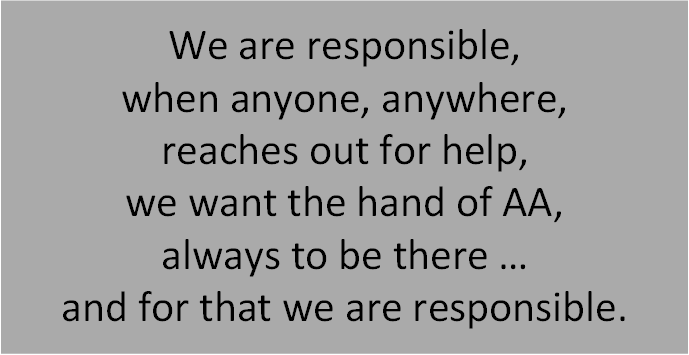“The idea is in the air that A.A. might adopt Thanks-giving week as a time for meetings and meditation on the Traditions,” A.A. co-founder Bill W. wrote in the November 1949 issue of the Grapevine (The Language of the Heart, p. 95) shortly after publication of the Twelve Traditions. In fact, the idea had already taken hold earlier in the decade when, each fall, the General Service Board hosted small Gratitude Dinners – precursors of the larger, more elaborate Gratitude Luncheons that would be held during the ’60s as an initiative of the trustees’ Public Information Committee.
The first official recognition of an A.A. Gratitude Week, specifically designed to coincide with Thanksgiving week in the U.S. (Canada celebrates in October), occurred in 1956, when the Sixth General Service Conference approved the motion, stipulating that “this action be noted in the annual pre-Thanksgiving appeals to the groups for funds to help support A.A.’s worldwide services.” Three years later, Bill urged in a let-ter, “Gratitude should go forward, rather than back-ward… if you carry the message to still others, you will be making the best possible repayment for the help given to you.” (As Bill Sees It, p. 29).
The motivation behind A.A.’s Gratitude Lunches was threefold: to express personal gratefulness for the gift of sobriety; to carry the message of A.A. to other alcoholics; and to express appreciation to our professional friends for their numerous articles, books and radio and TV interviews relating to A.A. in the year just past. It was hoped, in the words of a General Service Office memo circulated at the time, that the luncheons would “advance A.A.’s public relations by bringing editors, publishers, writers and broadcasters in personal contact with sources of reliable information on the movement.”
Held without fail in November at New York City’s Roosevelt Hotel, the luncheons were always well-attend-ed. A typical list of invitees to the 1965 luncheon included representatives of The New York Times, McCall’s Magazine, Medical World News and The Christian Science Monitor. Bill W. always addressed the gatherings, as did the late “Dr. Jack” Norris, then serving as A.A.’s Class A (nonalcoholic) trustee chairman. A discussion period followed the proceedings, an ample selection of A.A. literature was available for the taking, and in 1965 Bill sent an autographed copy of A.A. Comes of Age to every guest.
The luncheons were discontinued in 1968, but the concept of gratitude persisted and expanded in scope. For decades now, A.A.s in the U.S. have set aside all of November as Gratitude Month – marking the occasion with special contributions to G.S.O. In the spirit of the Seventh Tradition A.A. is self-supporting through its members’ contributions, and frequently turns away money from well-meaning outside contributors. This means that the active input of every A.A. is vital to the life of the Fellowship.
Grateful for the sobriety they’ve been given and eager to pass it on, A.A.s are busier than ever in Twelfth Stepping and service. They are reaching out in greater numbers to Loners, people with special needs, members of minority groups and previously unreached alcoholics. It is clear from their sharing that an overwhelming num-ber of A.A.s – along with many of our professional friends – find their own special ways to say thank you during Gratitude Month and, indeed, all year long. Writes one member: “Enclosed is a check for Gratitude Month, because I want A.A. to be there for all those who need it, just as I did.” From another: “The enclosed check is from my own pocket, to help groups in correctional facilities like mine. Some of us are struggling to turn our lives around. We begin the process in here ourselves, and by reaching out.” And a nonalcoholic missionary wrote from India, “It is a matter of great encouragement and satisfaction that your A.A. has been a rich resource of guidance, help and light for a number of organizations dealing with problems related to alcohol….”
Besides observing Gratitude Month, many a member uses the A.A. Birthday Plan “to give back what’s been given to me,” as one wrote. And from another fateful A.A.: “I want to say thanks today for my life and my family’s – or all of us alcoholics in recovery,” he wrote. “Enclosed is an anniversary check, because I want the hand of A.A. to be there for all who need it”. Like him, many members celebrate their A.A. birthdays by sending in a gratitude gift to G.S.O. – usually a dollar or two for each year of sobriety. Some groups follow this Birthday Plan by collecting contributions from members on a voluntary basis throughout the year, or until the number of dollars matches the member’s total years of sobriety. On the group’s anniversary, the money collected is sent to G.S.O. as a birthday contribution.
Gratitude. It’s a weighty, high-dignity word, but in truth its close companions are humor and joy. As Bill W. observed early on in the Big Book (p. 132), “Outsiders are sometimes shocked when we burst into merriment over a seemingly tragic experience out of the past. But why shouldn’t we laugh? We have recovered, and have been given the power to help others.” What greater cause can there be for rejoicing than this?
As published in
News and Notes from the General Service Office of A.A. ® Box 459 Vol. 46, No. 5 – October-November 2000



